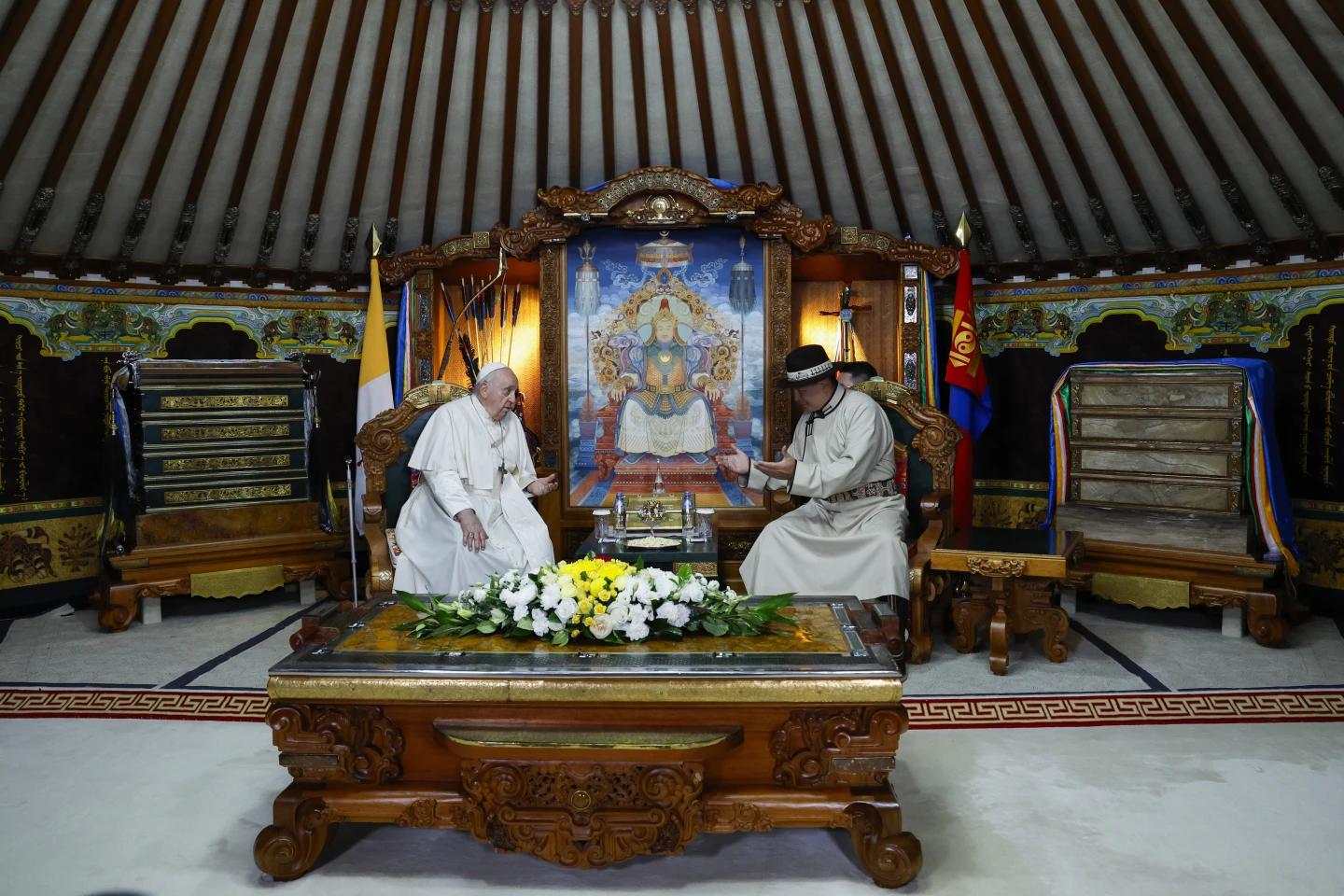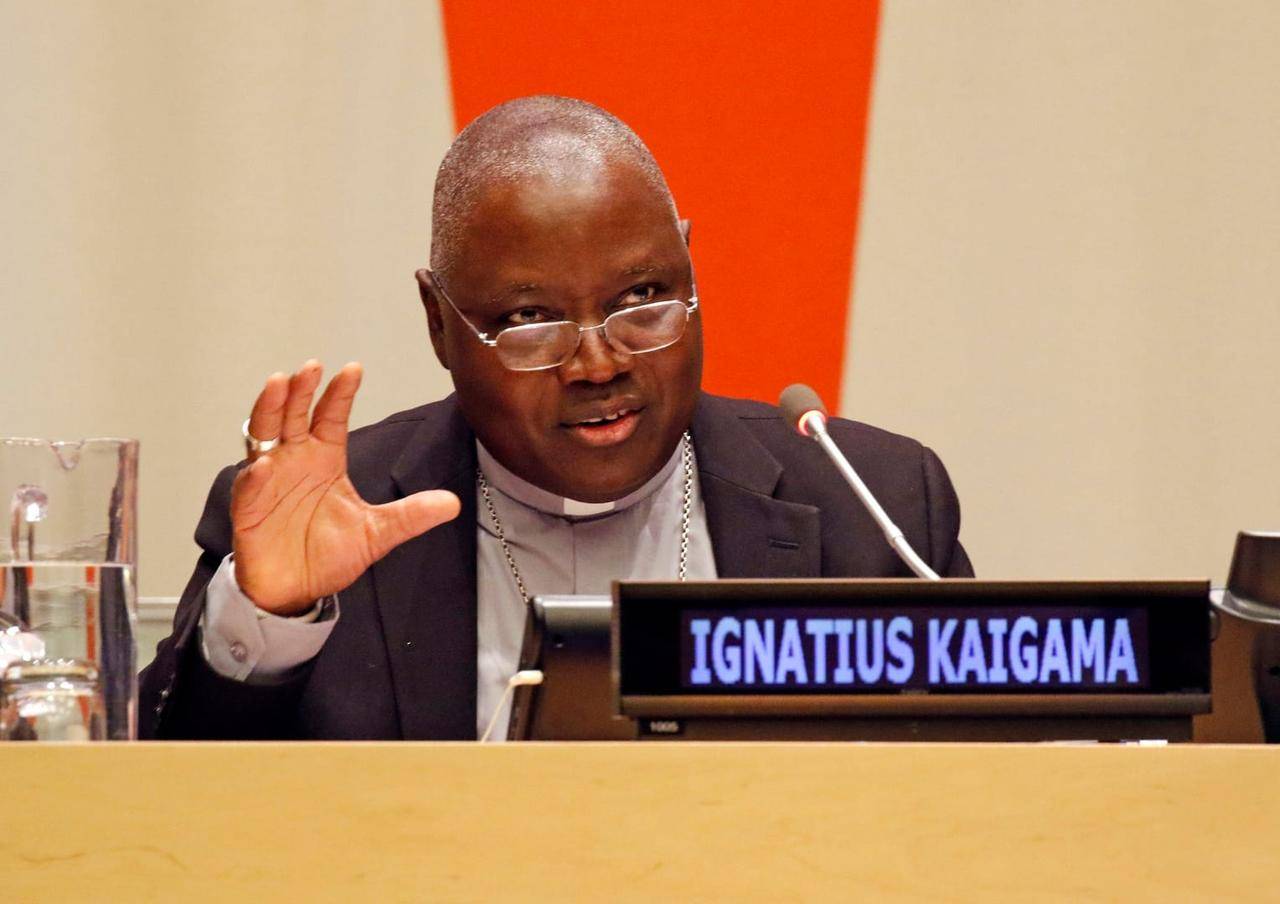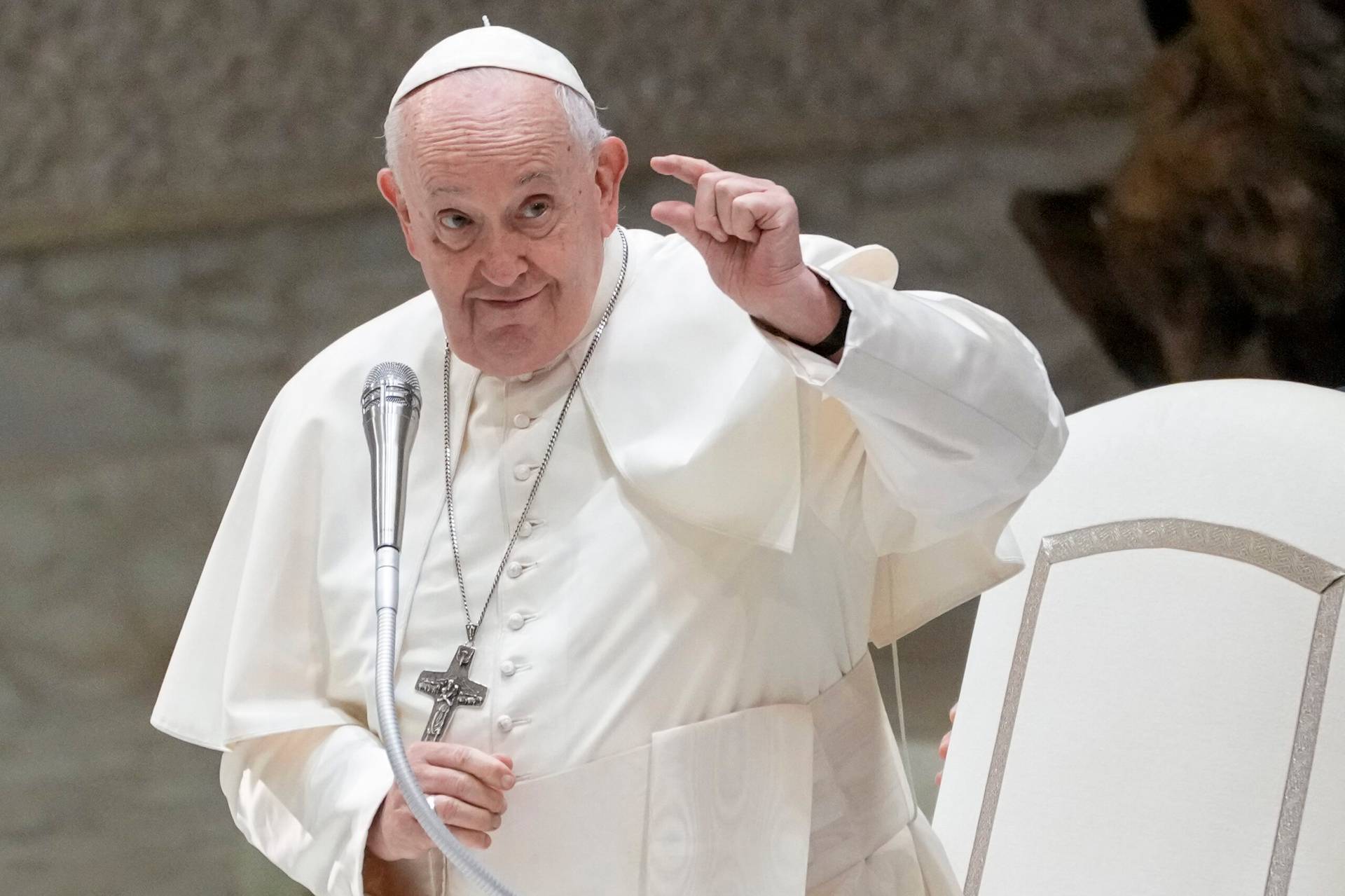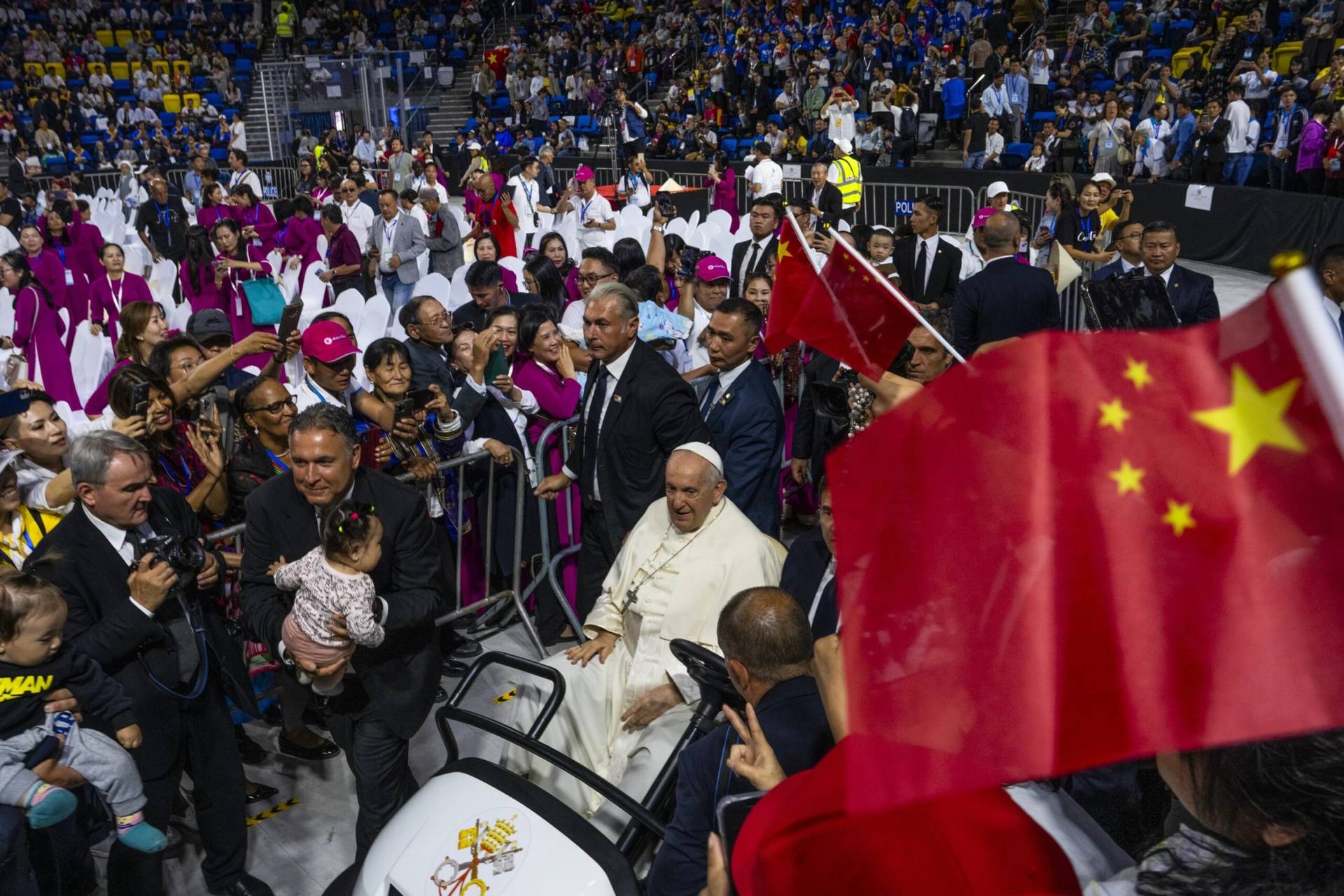ULAANBAATAR – Standing in a country that borders both Russia and China, Pope Francis on Saturday praised what he called Mongolia’s foreign policy of peace and prayed aloud that the “dark clouds of war” will be dispelled.
Although the pontiff did not specifically mention Russia’s ongoing war in Ukraine, given the context the reference seemed clear.
Speaking to national civil authorities in the Mongolian capital of Ulaanbaatar, the pope complimented Mongolia’s efforts in forging a broad network of diplomatic relations and its active membership in the United Nations, as well as its efforts “to promote human rights and peace.”
These efforts have a significant role both within Asia and on the international scene, he said, lauding Mongolia’s commitment to end nuclear proliferation and its decision to end capital punishment in 2015, with the law formally taking effect in July 2016.
“Mongolia is a democratic nation that pursues a peaceful foreign policy, but also proposes to play an important role on behalf of world peace,” he said.
Although Mongolia’s geographic proximity to China and Russia make those two superpowers its most important relationships, the country has also pursued what’s known as a “third neighbor” policy, establishing close ties with other nations including the United States.
Noting that this year marks 860 years since the birth of Genghis Khan, who formed the world’s largest empire after uniting all Mongol tribes, Pope Francis praised the Mongols’ ability “to acknowledge the outstanding qualities of the peoples present in its immense territory and to put those qualities at the service of a common development.”
“This model should be valued and re-proposed in our own day,” he said, asking that God would “grant that today, on this earth devastated by countless conflicts, there be a renewal, respectful of international laws, of the conditions of what was once the Pax Mongolica, that is, the absence of conflicts.”
He quoted a Mongolian proverb which states that, “The clouds pass away, but the sky remains,” noting that Mongolians traditionally assign spiritual significance to the sky.
“May the dark clouds of war be dispelled, swept away by the firm desire for a universal fraternity wherein tensions are resolved through encounter and dialogue, and the fundamental rights of all people are guaranteed!” the pope said in his speech.
He asked that in Mongolia, “so rich in history and open to the sky, let us implore this gift from on high, and together let us strive to build a future of peace.”
Pope Francis arrived in Mongolia Friday, making him the first pope to ever set foot in the East Asian nation. He will be on an official visit until Monday, meeting with both civil and ecclesial leaders and foreign missionaries.
He will also celebrate Mass for the country’s roughly 1,450 Catholics, as well as groups of faithful who come from other countries, including China and Russia, and he will inaugurate a new charitable center before returning to Rome.
After spending Friday resting to recover from his long flight and to acclimate to the 6-hour time difference between Rome and Ulaanbaatar, the pope Saturday morning met privately with Mongolian President Ukhnaagiin Khürelsükh prior to his speech to civil authorities. He is scheduled to meet with Prime Minister Oyun-Erdene Luvsannamsrai later Saturday morning.
In his speech, Pope Francis alluded to the often-silent simplicity of Mongolian people, saying he came as “a pilgrim of friendship, who comes to you quietly, with a joyful heart and the desire to find myself humanly enriched in your presence.
He noted that this year marks the 30th anniversary of the signing of a letter formalizing bilateral relations, and said he was giving authorities an authenticated copy of a letter from the third Mongol emperor to Pope Innocent IV in 1246, marking the first contact between the two states.
“May it be a sign of an ancient friendship that is growing and being renewed,” he said.
Francis focused much of his speech on the image of the traditional Mongolian ger, a round hut that is easily assembled and disassembled so it can be carried according to the needs of Mongolia’s nomadic culture.
One lesson the ger can offer, he said, is to “gaze towards the vast horizons everywhere around us, abandoning short-sighted perspectives for a broader, global vision.”
Praising Mongolia’s commitment to the environment, he said their respect for the delicate balance of the ecosystem sends a message “to those who in our own day reject the pursuit of myopic particular interests” and wish to pass on something fruitful to future generations.
He also lauded Mongolia’s “precious marriage of tradition and modernity” which he said is evident in the ger, as it joins different generations under one roof and bears witness to the continuity of the Mongolian people.
Speaking of Mongolia’s spiritual heritage, he noted that the highest point of every ger is a round window in the roof, saying the ability “to keep our eyes fixed on high” is essential for any religious tradition.
Mongolia, which is a majority Buddhist nation where Catholics are a tiny minority, is still in the process of rebuilding its religious landscape after the fall of Soviet Communism in 1992.
Pope Francis praised the country’s religious roots, saying, “a profound spiritual sensitivity belongs to the very fiber of your cultural identity, and it is proper that Mongolia should be a symbol of religious freedom.”
He said the Mongolian spirituality of silence and interiority is an antidote to the threat of “the consumerist spirit that nowadays, in addition to creating great injustices, leads to an individualistic mindset that cares little for others and for sound established traditions.”
“Having left behind, without bloodshed, the atheist ideology that thought it could eliminate religion, deeming it a hindrance to development, you have come to acknowledge and respect the fundamental importance of harmonious cooperation between believers of different faiths,” he said.
Speaking of Mongolia’s Catholic community itself, composed of a few dozen foreign missionaries and less than 1,500 Catholics who are led by Cardinal Giorgio Marengo, apostolic prefect of Ulaanbaatar, the pope said the Church, though small, works to promote a culture of “solidarity, universal respect and interreligious dialogue, and by working for justice, peace and social harmony.”
He voiced hope that a “farsighted” legislation be achieved which is attentive to the needs of local Catholics, including foreign missionaries, and which would allow them “always and without difficulty, to make their own human and spiritual contribution to Mongolia, for the benefit of this people.”
To this end, he said a bilateral agreement between Mongolia and the Holy See is being negotiated which he said marks “an important means for the attainment of those conditions essential for the pursuit of the ordinary activities in which the Catholic Church is engaged.”
Missionaries in Mongolia have long struggled with visas, being given only short-term visas requiring them to leave the country every three months with no guarantees that their visas will be renewed, no matter how long they have lived in the country.
Francis said there is “innate potential” in the collaboration between the Mongolian state and the Catholic Church, and cited the Church’s contributions to various aspects of society and culture, from environmental initiatives, to education, to healthcare and social assistance.
“I am certain that Mongolian Catholics will continue to offer readily their proper contribution to the building of a prosperous and secure society, in dialogue and cooperation with all others who dwell in this great land kissed by the sky,” he said.
Francis closed voicing hope that “the various components of Mongolian society, so well represented here, continue to offer to the world the beauty and nobility of this unique people.”
“In this way, like your traditional vertical script, may you remain ever ‘upright’ in your efforts to relieve the great human suffering all around you, reminding everyone of the dignity of each human being, called to dwell in our earthly home by embracing the sky,” he said.
Mongolia President Ukhnaagiin Khürelsükh reminded the pope of the long history of relations between the Catholic Church and the Mongol state, noting that in the 13th century Archbishop Plano Carpini wrote a book called History of the Mongolians, based a trip to the country from 1245 to 1247, which remains an important source for the study of both the country and the Eurasian region.
“Your state visit to Mongolia will inaugurate a new page in the history of our countries and make an historic contribution to further strengthening our relations and cooperation, which will be engraved with golden letters,” Khürelsükh told Francis.

















